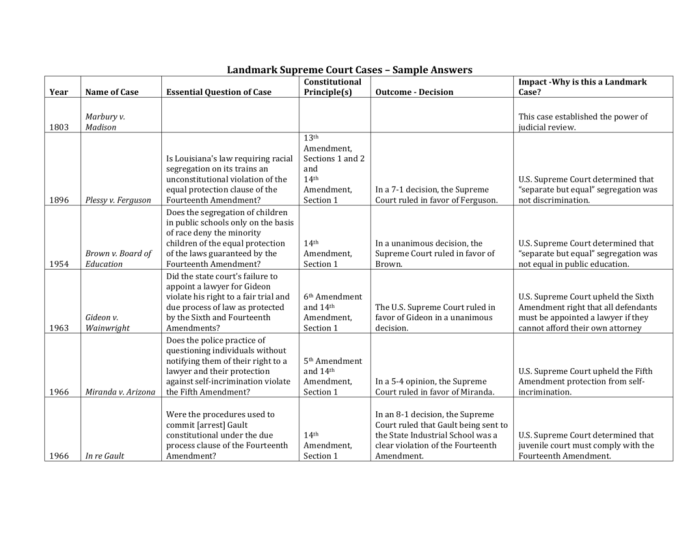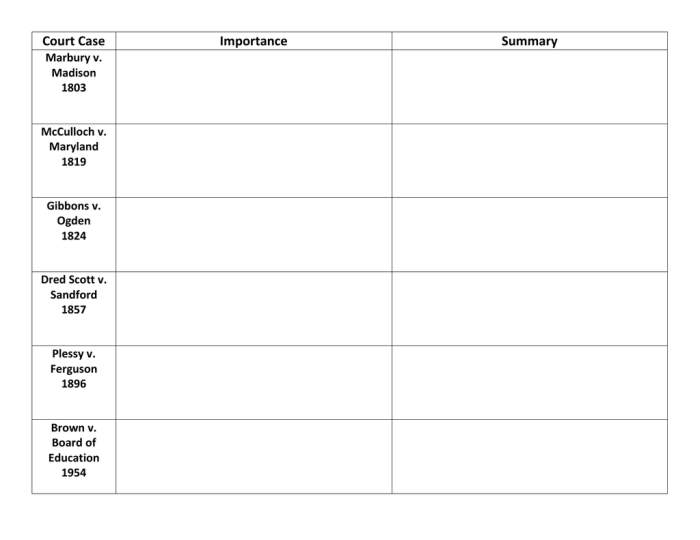Supreme court nominations worksheet answers pdf – Delving into the intricacies of Supreme Court nominations, this comprehensive guide offers a profound examination of the process, criteria, and impact of these pivotal appointments. By exploring the historical precedents, political dynamics, and key concepts, we gain a deeper understanding of the role of the Supreme Court in shaping American society.
Through a detailed analysis of notable nominations, case studies, and comparative perspectives, this guide provides a comprehensive overview of the Supreme Court nomination process, empowering readers with a nuanced understanding of its significance and implications.
Supreme Court Nominations: Overview

The process of nominating and confirming Supreme Court justices is a critical aspect of the American legal system. The President has the power to nominate individuals to the Court, while the Senate has the authority to confirm or reject these nominations.
This process ensures that the Court remains independent and accountable to the people.
Worksheet Analysis: Key Concepts
The worksheet on Supreme Court nominations covers key concepts such as the role of the President and Senate, the criteria for selecting nominees, and the confirmation process. Understanding these concepts is essential for comprehending the nomination process and its implications for the Court and American society.
Nomination Criteria and Qualifications
The President considers various criteria when nominating individuals to the Supreme Court, including their legal experience, judicial philosophy, and personal character. Nominees must meet certain qualifications, such as being a natural-born citizen, at least 30 years old, and having practiced law for at least 10 years.
Confirmation Process and Politics
The confirmation process for Supreme Court nominees involves a review by the Senate Judiciary Committee, followed by a vote by the full Senate. The process can be highly political, with senators considering the nominee’s qualifications, ideology, and potential impact on the Court’s balance.
Historical Precedents and Impact
Supreme Court nominations have a significant impact on American society and the legal system. Notable nominations, such as those of Ruth Bader Ginsburg and Clarence Thomas, have shaped the Court’s jurisprudence and influenced major decisions on issues such as abortion, affirmative action, and voting rights.
Worksheet Exercises, Supreme court nominations worksheet answers pdf
Interactive exercises based on the worksheet can enhance understanding of Supreme Court nominations. These exercises should require critical thinking, analysis, and application of concepts, and should be accompanied by answer keys or grading guidelines.
Case Studies: Notable Nominations
Case studies of notable Supreme Court nominations provide insights into the historical significance, controversies, and outcomes of these nominations. Analyzing these cases helps students understand the impact of Supreme Court appointments on the Court and American jurisprudence.
Comparison of Nomination Processes
Comparing the nomination processes for Supreme Court justices in different countries or historical periods highlights similarities and differences in the selection, confirmation, and qualifications of judges. This analysis provides insights into the implications of these differences for the independence and legitimacy of the judiciary.
Essential FAQs: Supreme Court Nominations Worksheet Answers Pdf
What are the key criteria considered in nominating Supreme Court justices?
Nominees are typically assessed based on their legal expertise, judicial temperament, commitment to the rule of law, and ability to interpret the Constitution.
How does the Senate play a role in the confirmation process?
The Senate Judiciary Committee holds hearings to evaluate nominees, and the full Senate votes to confirm or reject them by a simple majority.
What are some of the most controversial Supreme Court nominations in history?
Notable controversial nominations include Clarence Thomas, Brett Kavanaugh, and Amy Coney Barrett, due to allegations of misconduct, partisan divides, and concerns over their judicial philosophies.

